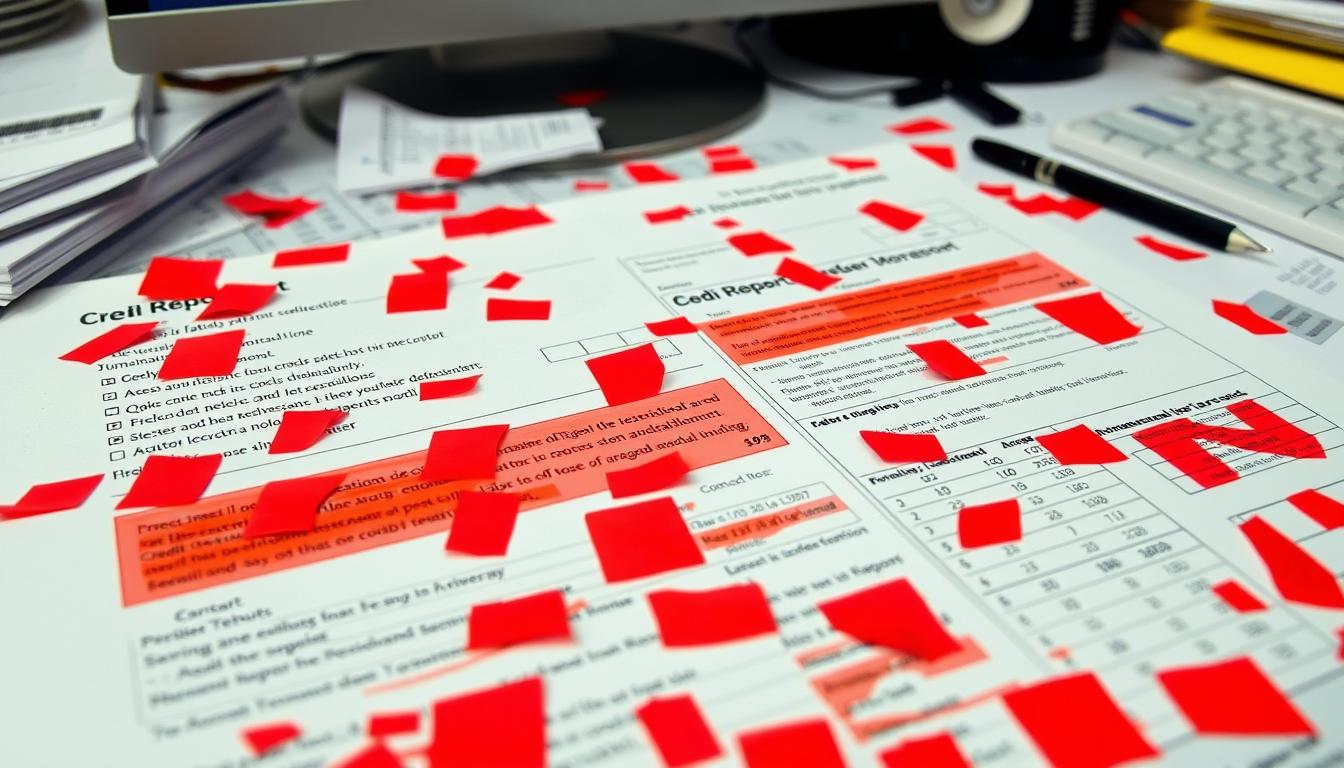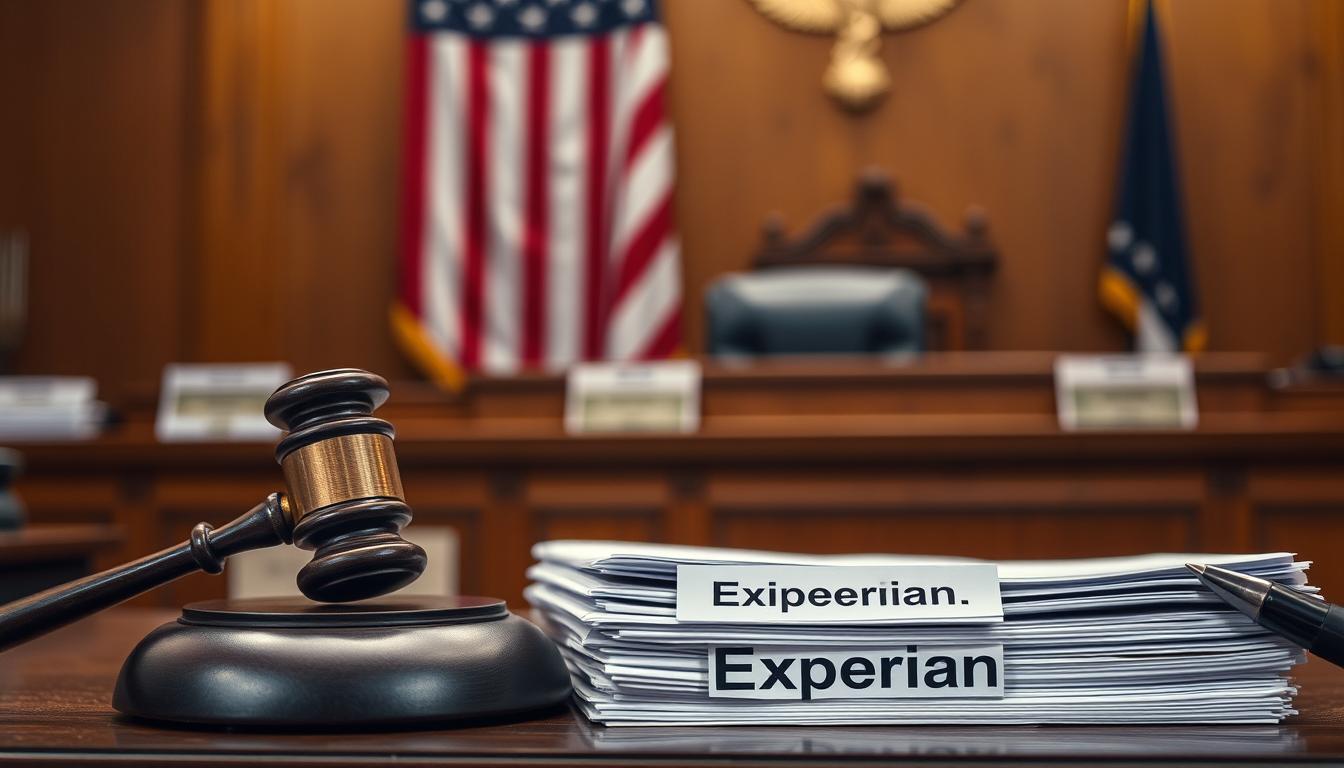Dealing with Experian credit report errors? You might have grounds to sue this major credit agency. The file lawsuit against experian, experian lawsuit, or sue experian process can be complex. But it’s crucial for protecting your credit rights.
This guide will help you understand the legal process. You’ll learn about your rights under the Fair Credit Reporting Act (FCRA). We’ll also discuss potential compensation for experian credit report errors, experian credit disputes, and experian credit report inaccuracies.
Key Takeaways
- Learn how to file a lawsuit against Experian for credit report errors, disputes, and inaccuracies
- Understand your rights under the Fair Credit Reporting Act (FCRA) and Experian’s legal obligations
- Discover the common reasons to take experian legal action and the potential damages you may be entitled to
- Explore the step-by-step legal process of suing Experian and gathering the necessary evidence
- Gain insights into Experian’s fair credit reporting act violations and how to protect your credit rights
Understanding Experian and Your Credit Report
Experian is a major credit bureau in the United States. It manages and reports consumer credit information. Understanding Experian’s role is crucial for your credit report.
The Role of Credit Bureaus
Credit bureaus collect and report credit data for individuals. This includes details about credit accounts, payment history, and credit use. They create credit reports for lenders and others to evaluate creditworthiness.
Experian’s Responsibilities
Experian must ensure accurate credit reports. They verify information from creditors and update credit profiles promptly. They also investigate disputes and errors reported by consumers.
Experian provides access to credit reports and scores. They educate consumers about their rights under the Fair Credit Reporting Act (FCRA).

Knowing Experian’s role helps you navigate your credit report. You can take steps to ensure its accuracy. This knowledge protects your financial well-being and credit-related rights.
Common Reasons to File a Lawsuit Against Experian
Experian, a leading credit reporting agency, can make mistakes or neglect legal duties. These issues can seriously impact consumers, prompting legal action against Experian.
Here are common reasons why people might sue Experian:
- Experian credit report errors: Inaccuracies on credit reports can harm a consumer’s creditworthiness. These may include wrong account info or incorrect personal details.
- Experian credit disputes: Failing to properly investigate and resolve consumer disputes about credit report information. This violates the Fair Credit Reporting Act (FCRA).
- Experian credit report inaccuracies: Providing lenders with wrong credit information can lead to unfair treatment. It may result in credit denial.
- FCRA violations, like not ensuring maximum accuracy of reports. Also, mishandling consumer disputes breaches the FCRA.
These issues can cost people job opportunities, housing options, and financial services. Legal action may help recover damages and force corrections.
It can also compel Experian to improve its practices. This protects consumers’ financial well-being and legal rights.
“Experian has a responsibility to ensure the accuracy and integrity of the credit reports they provide. When they fail to uphold this duty, consumers have the right to seek legal recourse.”

Knowing why people sue Experian helps consumers protect their finances. It allows them to hold credit agencies accountable.
This knowledge empowers individuals to work towards a fairer credit reporting system. It promotes transparency in the industry.
Experian Credit Report Errors and Inaccuracies
Errors on your Experian credit report can hurt your financial health. These issues range from wrong personal info to false accounts. It’s vital to spot and challenge these problems.
Identifying Errors in Your Credit Report
Check your Experian credit report often for experian credit report errors. Look for mistakes in your name, address, or birth date. Make sure account details, balances, and payment history are correct.
Watch for unknown accounts or inquiries. These might signal identity theft or fraud. Spotting these issues early can protect your credit score.
Disputing Errors with Experian
Found experian credit report errors? Act fast to dispute errors with experian. Contact them online, by mail, or phone. Provide clear proof to back your claim.
Use billing statements or payment records as evidence. By law, Experian must check disputed items and fix errors quickly.
| Common Experian Credit Report Errors | How to Dispute with Experian |
|---|---|
|
|

“Fixing experian credit report inaccuracies is key for a healthy credit profile and better financial chances.”
file lawsuit against experian
Experian’s inaccurate credit reporting or unfair practices can be frustrating. Filing a lawsuit might be your best option. The process involves crucial steps to boost your chances of success.
Document all interactions with Experian carefully. Keep detailed records of communications, disputes, and responses. This documentation will serve as vital evidence in your case.
- Identify the specific legal grounds for your lawsuit, such as violations of the Fair Credit Reporting Act (FCRA) or other applicable laws.
- Gather all relevant evidence and documentation, including copies of your credit reports, any correspondence with Experian, and any evidence of financial harm or damages.
- Consult with an experienced consumer rights attorney who specializes in how to sue experian and can guide you through the steps to file lawsuit against experian.
- Formally file the lawsuit against Experian, following the appropriate legal procedures in your jurisdiction.
The path to file lawsuit against experian can be complex. With the right approach and legal help, you can hold them accountable. Seek the justice you deserve.

| Key Steps | Description |
|---|---|
| Document Interactions | Maintain detailed records of all communications and disputes with Experian. |
| Identify Legal Grounds | Determine the specific legal violations, such as FCRA violations, that justify your lawsuit. |
| Gather Evidence | Collect all relevant documentation, including credit reports and financial records. |
| Consult an Attorney | Seek the guidance of a consumer rights lawyer experienced in how to sue experian. |
| File the Lawsuit | Initiate the legal proceedings by formally filing the lawsuit against Experian. |
“Taking legal action against Experian can be a daunting task, but it’s often the only way to hold the credit bureau accountable and seek the justice you deserve.”
Experian’s Fair Credit Reporting Act Violations
Experian, a major U.S. credit bureau, must follow the Fair Credit Reporting Act (FCRA). This law sets rules for handling consumer information. Sadly, Experian has often broken these rules, hurting many consumers.
Your Rights Under the FCRA
The FCRA gives consumers important rights about their credit reports. These rights apply to credit bureaus like Experian.
- Obtain a free copy of your credit report annually
- Dispute any inaccuracies or errors on your credit report
- Be notified when negative information is added to your credit report
- Limit who can access your credit report and for what purposes
- Seek damages if a credit bureau violates your FCRA rights
When Experian breaks these rules, it’s an FCRA violation. You can sue Experian for these violations. This allows you to seek money for harm caused by Experian’s actions.
| FCRA Violation | Example |
|---|---|
| Failing to investigate disputes | Experian neglects to properly investigate a consumer’s dispute over an inaccurate item on their credit report. |
| Reporting inaccurate information | Experian includes incorrect public record data or outdated information on a consumer’s credit report. |
| Improperly accessing credit reports | Experian allows an unauthorized third party to access a consumer’s credit information without their consent. |
Know your FCRA rights to fight back if Experian breaks the law. This can help fix experian fair credit reporting act violations. It can also solve experian credit report legal issues you might face.
The Legal Process of Suing Experian
Taking legal action against Experian for credit report issues can be complex. Understanding the process can help you make better decisions. Let’s look at the legal process of suing Experian and the steps involved.
First, consult a qualified credit law attorney. They can review your case and identify any Experian Fair Credit Reporting Act (FCRA) violations. They’ll advise you on the best legal action and help gather evidence.
The steps to sue Experian typically include:
- Filing a lawsuit: Your attorney will file court paperwork outlining your case and desired damages.
- Discovery phase: Both sides gather and exchange evidence, including documents and witness statements.
- Negotiation and settlement: Your attorney may try to settle with Experian to avoid trial.
- Trial and judgment: If no settlement is reached, the case goes to trial for a final decision.
The Experian lawsuit timeline varies based on case complexity and court caseload. It can take several months to over a year. Your attorney can give a more accurate timeline.
Work closely with your attorney throughout the process. Provide all necessary documents and stay patient. Understanding the steps and timeline can help you navigate the Experian lawsuit more effectively.
Gathering Evidence and Documentation
Gathering comprehensive evidence is vital when filing a lawsuit against Experian. It strengthens your case and supports your claims. The documentation you collect can make or break your lawsuit, serving as the foundation for your claims and demands.
Organizing your evidence thoroughly prepares you for the legal process. It also boosts your chances of a favorable outcome.
Maintaining Accurate Records
Keep detailed records of all interactions with Experian. This includes phone calls, emails, and written letters. Save copies of disputed credit reports and Experian’s responses.
Collect financial documents, statements, and receipts related to your credit report issues. These will support your case against Experian.
- Compile copies of your Experian credit reports, highlighting any inaccuracies or errors.
- Retain all written communication, such as letters, emails, and faxes, exchanged with Experian.
- Document any phone calls with Experian representatives, including the date, time, and a summary of the conversation.
- Collect any financial documents, such as bank statements, loan applications, or payment receipts, that support your claims.
Maintaining comprehensive records provides crucial evidence for experian lawsuit. It helps substantiate your claims and proves how to maintain records for experian lawsuit.
This careful approach strengthens your legal case. It also increases your chances of a positive outcome.
Potential Damages and Compensation
Filing a successful lawsuit against Experian may entitle you to various forms of compensation. These include actual damages, statutory damages, and possibly punitive damages. Punitive damages apply when Experian willfully violates the Fair Credit Reporting Act (FCRA).
Actual damages cover financial losses caused by Experian’s errors or negligence. This may include credit repair costs, lost opportunities, or loan difficulties. These damages aim to restore your financial situation.
The FCRA also allows for statutory damages. These range from $100 to $1,000 per violation. Such damages discourage credit bureaus from unlawful practices. They also encourage accurate and complete credit reporting.

